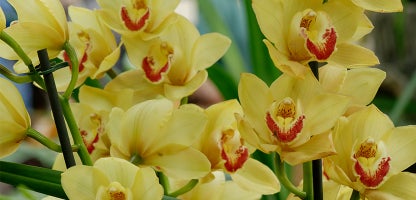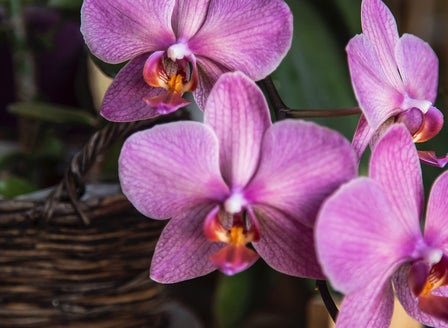Orchids have long-lasting, elegant blooms that form a striking contrast with their glossy foliage.
Planting Calendar
Indoor grown orchids are usually available throughout the year.
Prepare
Position
Indoor orchids prefer a warm well lit position but out of direct sunlight. Cymbidium (outdoor orchids) prefer to be in a partly shaded position with protection from the hot midday sun.
Soil
Orchids are Epiphytes (living out of soil up the branches of trees) and naturally attach their roots to the bark of trees. This is why it is important not to plant them directly into regular soil or potting mix. They must be planted in Kings Orchid Mix.
Plant
Orchids like their roots to be tight in their pot. Repot once the roots have grown out of the holes in the bottom of the pot and have finished flowering. Repot into a specific orchid mixed into a pot just one size larger. To re-pot, shake off the old mix as carefully as you can, to avoid damaging the roots. Hold the plant in the new pot and gradually fill it in with your Kings Orchid Mix, making sure the plant is at the same level as it was before. Gently pack the mix down onto the roots so the plant stays upright. Water the new mix thoroughly, letting the excess water drain away.
Care
Watering
Don’t let your orchid sit in water! Use around 1 litre of water per plant and ensure that all excess water drains out. If your orchid is in a plastic pot placed inside a cover pot, remove from the cover pot before watering. Watering requirements vary depending on how warm the room and season is. In most cases water once every 7 to 10 days in summer, and once every 2-3 weeks through winter. Once every month, hold the pot under a tap and let the water flow through the mix, getting rid of any salt build up. Avoid watering the foliage.
Feeding
Feed with Thrive Liquid Orchid Food once every 4 to 6 weeks when watering. Keeping your orchid fed will help it flower for longer and keep it looking lush.
Spraying
Keeping your plant well fed and watered minimises the risk of pest and fungal problems. Mealybug and scale are the main pest problems and can sometimes appear at the very base of the plant. To get rid of them, spray with Groventive Garden. Repeat spraying may be necessary.
Pruning
Prune flower stems that have finished just above the second node (or bump) on the stem. This will encourage a second flower spike to grow from the original flower stem.
General Care
When using sprays, chemicals or fertilisers, always read the label and follow the instructions. Apply sprays in the evening to avoid harming beneficial insects. Roots growing out of the holes in the pot is a sign that the plant needs to be repotted into a new pot, one size larger. When repotting, use Kings Orchid Mix. Water the new mix thoroughly, letting the excess water drain away. Only repot once the orchid has finished flowering.
Beginner Tip
The roots which grow out of the top of the pot are aerial roots, which are just a natural part of the plant's growth. It is best not to remove these.
Expert Tip
Once an orchid has finished flowering it will need around a month with daily temperatures that drop by about 10 degrees between day and night, to entice the plant to reflower. Winter usually provides this.
Top Varieties

Cymbidium
Perfect for outdoors. Grow in a sheltered, brightly lit area and keep them protected from the midday sun. They are best grown in a container rather than straight into the ground. Like moth orchids, they need a free draining mix such as Kings Orchid Mix, and flower throughout the winter months. Bring the plants indoors while flowering, or remove the stems and use them as cut flowers.
Frequently Asked Questions
Why are my orchid leaves going yellow?
Orchid leaves can go yellow for a multiple of reasons. There may be in direct sunlight or the plant has dried out to much, or been over watered. Make sure your Orchid is in a well lit position that is out of direct sunlight. When watering allow the soil to dry out before watering again, and ensure that the roots never sit in any water. During the hotter parts of the year watering every 7-10 days is usually about right.
Why are my orchid leaves pale green?
Your Orchid may be lacking in fertiliser. Feed regularly as per the instructions with a liquid Orchid food.
Why are there roots growing out the top of the pot?
The roots which grow out of the top of the pot are aerial roots, which are just a natural part of the plant's growth.
Why is my orchid rotting?
You are probably over watering it. Cut back on your watering. Let the plant completely dry out then water thoroughly and drain very well. Do not have your plant sitting in water.
